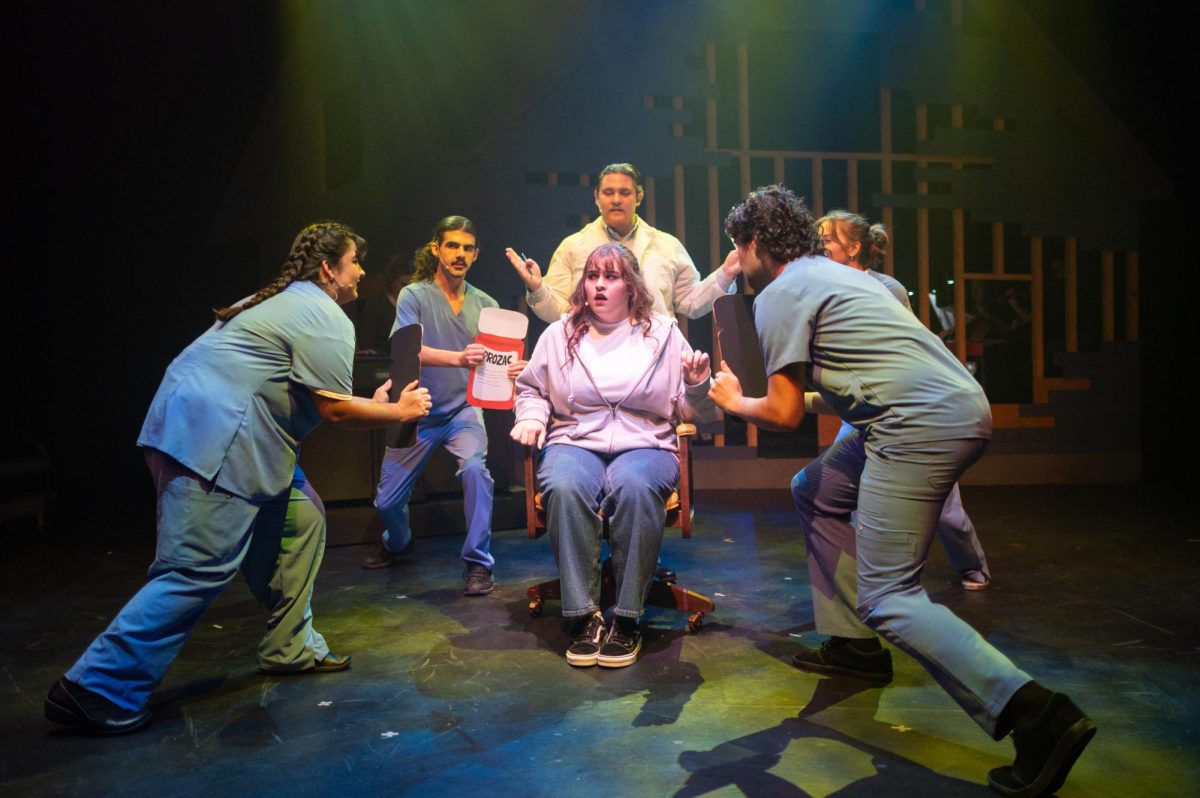
Carlos Rivera and Alex Montes de Oca are arguably the best guitarist and bassist, respectively, at Chico State.
The senior students are currently bandmates in the university ensemble Jazz X-Press, and will be performing in the music and theater department’s annual Glorious Sounds of the Season holiday concert Dec. 5-7.
Although neither has much of a jazz background, the ensemble has helped make them aware of who they are now as musicians, as well as who they might want to be in the future.
“I grew up listening to a lot of those hair metal bands like Van Halen, Motley Crue, Scorpions, all those guys,” said Rivera, a music industry major. “I feel like I’m going back in time. I started back in the ’80s and now I’m playing this stuff from the 1800s.”
The 1800s stuff he’s referring to is the reason he’s even in Chico, he said. He plans to take his education even further after graduation: he’s auditioning for San Francisco Conservatory of Music’s master’s program in classical guitar in February.
Montes de Oca, a recording arts major, is similarly influenced by heavier bands, citing System of a Down, Between the Buried and Me and Animals as Leaders. But he’s also studied great bassists like Jaco Pastorius and Victor Wooten while at Chico State.
“I’ve always been drawn to rhythm,” Montes de Oca said. “I’m almost more of a percussionist in a lot of ways than I am a melodic player. And that’s what I love about bass — it’s a rhythm instrument rather than a melodic instrument. You’re supposed to provide the harmonic foundation while also providing the rhythm.”
The transition to jazz hasn’t been easy for either musician. In addition to reading charts and notation, they both have had to adjust to new instruments along the way.
“Just since I’ve been here in the last two or three years, I’ve gotten into playing the upright bass, and that’s just like a totally different instrument entirely,” Montes de Oca said. “I mean, it can serve some of the same functions, but it feels different to play, it sounds different and I use it for different things.”
Before the upright bass, he preferred his five-string electric bass, which offers an extended low end and different hand position opportunities.
He does most of his writing on the electric because it is fretted, he said, which makes it a lot easier to keep in tune.
“The upright is really good for walking bass,” Montes de Oca said. “I feel the pulse better and the hand positions feel natural. On the electric, walking doesn’t feel as interesting. But, on the other hand, the five-string is better for melodic voicing and for chords and arpeggios.”
Rivera, however, seems to have completely switched over to classical guitar altogether, and shows no signs of going back.
“I just love the whole sound and just the idea of classical guitar,” he said. “It’s actually built differently than a normal acoustic. The neck is wider and the strings are different and you play with your fingers instead of a pick. I had to grow my nails out on my right hand so each finger kind of acts like a pick. It was so weird at first having long nails on one hand and not on the other, but you do what you gotta do.”

Foreign instruments and claws aside, Rivera and Montes de Oca are the same people they’ve always been. New experience has just given them a new direction.
For Rivera, there’s nothing better than performing by himself with his classical guitar.
“I like the idea of playing a show with just me playing guitar and there’s no band or anything,” he said.
He’s always been a solo performer for the most part, but he’s never been able to sound they way he can now.
“There’s a ton of stuff to listen for in classical guitar pieces,” Rivera said. “That’s what I like about it. There’s all these textures and nuances that can be heard. When you look at someone playing classical guitar really well, it looks like they’re not doing anything, but you hear all these sounds and you’re like, ‘What? How’s he doing that?’ But they all just look so relaxed.”
Montes de Oca doesn’t share Rivera’s comfort in the spotlight, but might be warming up to the idea. When he started playing bass in high school, he flourished in the low-pressure atmosphere of his various rock bands, where members never noticed when he made mistakes.
“You just turn the tone down enough where it’s just the subharmonics and the fundamentals and nobody really notices,” he said. “They hear the thump, and as long as you’re playing in time, people tell you it sounds great.”
Now, he still holds the groove and is more felt than heard, but sometimes takes solos.
“I still panic every time,’cause it’s really exposing,” he said. “As a bass player, that’s still something that I’m really getting used to — people hearing what you’re playing and actually paying attention to it.”
Although he is most comfortable as a background player, Montes de Oca wants to push the boundaries of his instrument and his own musicality.
He said he’s going to have to be able to play grooves and background lines while at the same time coming up front and being the melodic instrumentalist he wants to be.
Because of heightened expectations as a bassist, sometimes there is something to prove, he said. Just because someone plays bass doesn’t mean they have to be in the background.
“Yeah, sometimes it is an ego thing, I’m not gonna lie,” he said. “But it’s always nice to blend in too.”
Trevor Whitney can be reached at [email protected] or @nicegrandmas on Twitter.










